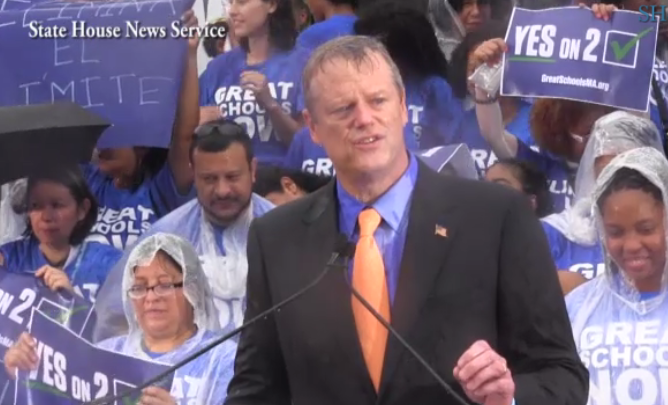Next month, marijuana will be legal in Massachusetts. That’s the verdict from voters in Tuesday’s election. The proposal was among four statewide ballot questions.
RELATED: Community Preservation Act Passes In Three Western Mass. Communities, Fails In Two Others
Governor Charlie Baker is a popular guy. His approval ratings hover around 70 percent. But on the two ballot questions that Baker chose to stick his neck out on, voters thought better.
First — on marijuana:
“I, like many others [who] worry about the communities of the commonwealth, urge a no vote on Question 4,” Baker said earlier this month.
But those noes were outnumbered by the yeses.
“I don’t see any difference between recreational alcohol use and recreational marijuana use,” said Laurie Lenski of Pittsfield. “I feel like it’s the same thing.”
“Now, you put it in a situation where you’re not only taxing people on it, but you’re also keeping it away from people who are under 21,” Joseph Gleason, of Holyoke, said.
Those arguments got heavy rotation from the well-funded campaign to legalize marijuana. But that money was dwarfed by what was spent by both sides in the charter school debate.
When legislation to raise the cap on the number of charters in the state stalled, Governor Baker got behind a ballot question that would allow a dozen new or expanded charters every year. He even campaigned in heavy rain, on the steps of the State House.
“I hope everyone in Massachusetts who cares about the schools kids go to, steps up and does the right thing for every child here in the commonwealth, clears the clouds, brings out the sun and delivers a yes vote,” Baker said.
But again — voters felt otherwise, more than 60 percent of them.
William Mendez, 35 years old, is a construction worker from Holyoke. His children go to a charter school, but he still voted no. A better plan, he says, is to “keep with the public schools and make the public schools better. Pay these teachers better for they can teach these kids better.”
After the results were in, the governor sent out a statement saying that, despite the loss, the goal remains unchanged: provide more choices to students in struggling districts.
The more likely immediate work for the legislature, though, is on marijuana. Even state Senate President Stan Rosenberg — the only top official to come out in favor of legalization — has major problems with the measure: its relatively low tax rate, and how police will catch people who get high and drive.
But here’s one date to keep in mind: December 15th. That’s when marijuana for recreational use becomes legal in Massachusetts.
Massachusetts voters on Tuesday also approved a measure banning small cages for some farm animals, and they rejected a proposal for a second slots parlor in the state.
The State House News Service and New England Public Radio’s Karen Brown, Adam Frenier and Kari Njiiri contributed audio to this report.
